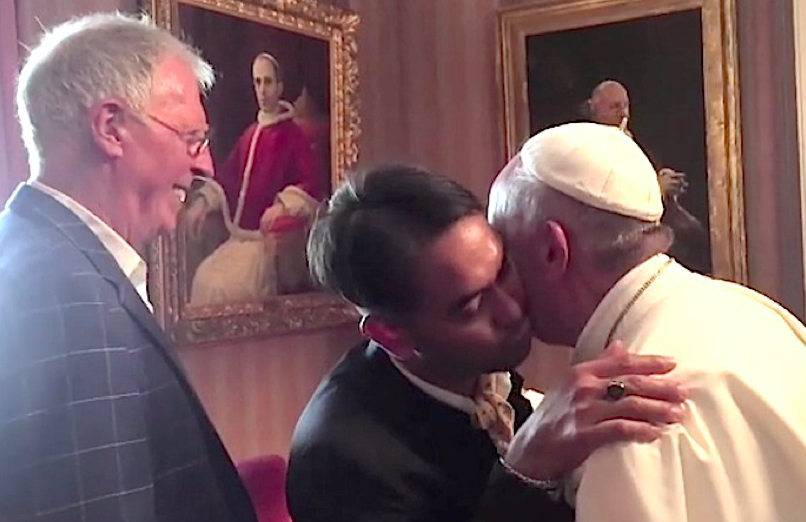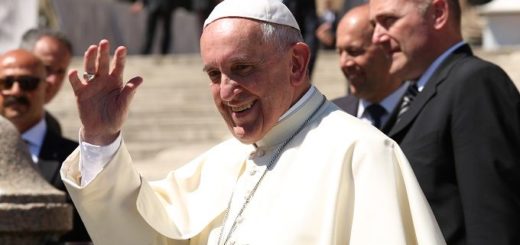“OWN YOUR HERESY” – continuing the debate on Pope – 2

In the picture: Video still from Pope Francis's audience with his gay former student, Yayo Grassi (left) and his partner Iwan Bagus
(Note: Francis is prophetically critical of neoliberal capitalism, but not so critical of gender and sexuality based inequality, argues the article below.james kottoor, editor)
In the wake of his September visit to the United States, a great deal was written about Pope Francis’s “audience” with Kim Davis, the county-court clerk from Kentucky who has become (in)famous for refusing to process marriage licenses for same-sex couples. Having served one stint in jail on federal contempt charges, Davis has become the heroine in a melodramatic conservative-Christian narrative that seeks religious-freedom exceptions from federal and state anti-discrimination laws, especially those barring sexual-orientation discrimination.
The first, relatively un-detailed reports of Kim Davis’s meeting with the pope—which took place Sept. 24 at the Vatican Embassy in Washington—gave way to an avalanche of news articles and a furious debate, especially among U.S. Catholics, over how to interpret the encounter.
There’s a lot of room for doubt in claims that this meeting represented some sort of Vatican “endorsement” of Davis—and liberal Catholics became almost apoplectic in refuting such an endorsement—but the truth about the Francis-Davis encounter is, in some ways, beside the point. The real issue is what the debate over the encounter reveals about the limits of liberation among liberal/progressive Catholics, who mostly have good cause for celebrating this Latin American papacy.
Francis has become a hero among left-Catholics for his prophetic critique of globalized, neoliberal capitalism, and for the apparent humility and openness of spirit Francis has brought to that critique. At the same time, many on the left have tacitly exonerated the pope for consistently failing to train the same prophetic energy on Catholic exclusions based on gender and non-heteronormative sexualities. Queer and feminist Catholics, as well as those familiar with latter-day debates among liberation theologians in Latin America, cite these lacunae as proof that Francis’s vision of liberation, while moving constructively forward on some fronts, remains partial, limited, stunted. The non-debate over Roman Catholicism’s views on gender and sexuality has been most deafening at this month’s Synod on the Family.
The controversy over Francis’s meeting with Davis brings these issues into relief. Even if we accept that the meeting cannot be read as a papal endorsement of Kim Davis and her politics, it’s still clear that Francis and Davis are in substantial agreement: Both are committed to limiting the equal standing of LGBTQ Christians, in Church and in society, because homosexuality is supposedly unnatural. In the face of that fact, the no-holds-barred defense of Francis among left-Catholics has the effect of squelching a much-needed debate on the limited liberation proffered by his papacy on questions of gender equality, sexuality, and the family.
An audience or an endorsement?
Conservatives framed the Francis-Davis encounter as a proper private audience, before a pope who had been following Davis’s saga—including her jailing on a federal contempt citation. To conservatives, Davis was the sort of “conscientious objector” to whom Francis made reference during his widely-cited remarks to reporters on the papal jet back to Rome. Francis was holding Davis up as a latter-day martyr exercising a fundamental human right to testify to her religious objections.
From the other corner came liberal Catholics, who fiercely refuted any suggestion—often without reliable evidence or reportage—that the meeting had any importance, or, in some cases, that it even took place. They argued that news of the non-meeting was leaked by publicity-chasing conservative politicians and activists, like Davis’s attorney, Mat Staver, or that traditional-family-values conservatives in the U.S. Conference of Catholic Bishops had arranged the meeting to discredit Francis.
Liberals sought to deny the meeting’s importance—either arguing that it didn’t have the dignity of a high-profile private audience with the pontiff, or that Francis had somehow been bamboozled: that he couldn’t have known the sort of (dastardly) person Kim Davis was.
As Fr. James Martin put it in America:It’s hard to know how much Pope Francis knew about each individual who was introduced to him during his long trip to the United States. Did he know much about Kim Davis before meeting her? Was he following her case before he entered the country? Did he learn about the controversy from a local bishop after he arrived? Or was her story quickly relayed to him in a receiving line? And how was it explained to him? …
Amid the uproar I cannot help but notice how loathe liberal Catholics have been to entertain the possibility that something substantive might have been exchanged between them in the “encounter”—or whatever it was! Downplaying the importance of the meeting, Fr. Martin proposed that “if you want to know what the pope thinks about this issue, listen to what he says.” I agree, above all because I am disappointed to see so many of my left-Catholic friends and colleagues rushing to defend this pope at the cost of disabling a necessary critique of this papacy on matters of gender, sex and family.
I want to note that I’m cheered by the change in tone augured by Francisco’s leadership. He’s done much that has moved me personally—sometimes deeply. Francis has made it abundantly clear that he is not going to promote division in the Church by supporting the old politics of thinly-veiled homophobia and misogyny that accompanied so much previous episcopal politicking on matters of sexuality, gender, and the family. That change in tone is so constructive—but by itself it’s insufficient.
This is the point that the flame war over the Francis-Davis meeting completely smoked out: When it comes to the matter of same-sex marriage and the nature of the family, Francis and Davis are on the same page.
What the pope has said—and failed to say—about family, sexuality, and the place of women in the Church leaves a great deal to be desired. Even under his mandate to squelch the hostile rhetoric, we can still hear in his own writings the painful echoes of past Roman Catholic teaching, especially its natural-law predicates, which remain the discursive foundation for the continued secondarity of women and queer Catholics in this papacy. A few examples of Pope Francis’s limited notion of liberation should suffice.
Francis’s limited ‘Liberation Theology’
His apostolic exhortation, Evangelii Gaudium (2013), reaffirms the exclusion of women from the priesthood while calling for “broader opportunities for a more incisive female presence in the Church.” Evangelii Gaudium recognizes women mostly in terms of afeminine principle (“the sensitivity, intuition and other distinctive skill sets which they, more than men, tend to possess,” and “the special concern which women show to others, which finds a particular, even if not exclusive, expression in motherhood”) and affirms the stained-glass ceiling on the pastoral role of women: “the reservation of the priesthood to males … is not a question open to discussion” (#103).
Francis further worried that a discussion on women’s ordination “can prove especially divisive if sacramental power is too closely identified with power in general”—as if the “reservation of the priesthood to males” had nothing whatsoever to do “with power in general” (#104).
Evangelii Gaudium likewise suggested that campaigns to give sacramental or civil equality to same-sex-headed families, or same-sex-loving individuals, arise from the ungodly politics of secular cultures (#64) that, according to Francis, must countered with “objective moral norms which are valid for everyone.” In support of this proposition the pope cited sentences from the U.S. bishops’ 2006 guidance on “Ministry to Persons with a Homosexual Inclination,” criticizing the “moral relativism” of queer Catholics seeking cultural or sacramental recognition and equality in the Church.
Francis is even more direct in his 2013 encyclical, Lumen Fidei, which defines the family as the “stable union of man and woman in marriage” (#52), echoing the very definition of family that Kim Davis defends when she refuses to process marriage licenses in Kentucky.
Compared with the two popes who preceded him, Francis’s tone is decidedly softer, kinder, gentler—yet there’s no change in underlying doctrine or its natural-law perspective. Gone is the bone-curdling language of homosexuality as “objective disorder” and “intrinsic moral evil”—per the Vatican’s 1986 instruction “On the Pastoral Care of Homosexual Persons.” But between the lines of Francis’s gentle cathedra we can still read of homosexuality as a malformed human condition; of queer Catholics seeking specious legal rights and canonical rites; of the deadly risks of moral relativism; and of the dangerous siren-song of our secular culture’s bohemian rhapsodies. We have come some way from the Catholic anti-modernism of the nineteenth-century, but its ghost remains faintly vibrant in Francis’s magisterium.
To debate whether the meeting between Francis and Davis was a real papal audience or a “meet and greet” (as one colleague put it) misses the larger point: On the fundamental questions of family and (homo)sexuality, the pope and Davis agree that same-sex couples should not have their unions recognized as a matter of secular or canon law. Francis says unambiguously that attempts to legitimize same-sex families pose a threat to God’s divine plan for the human race. He said this out loud in Buenos Aires, as Archbishop Jorge Mario Bergoglio, when he opposed Argentina’s marriage equality laws. As pope, Francis will no more permit same-sex marriages to occur in his jurisdiction than Davis will in hers.
Which brings me to my last reflection on the meaning of this meeting: the question of liberation theology and the option for the poor in Francis’s papacy. Left-Catholic defenses of Francis typically point to the pope’s powerful and unambiguous reassertion of an economic option for the poor—one that looks a great deal like the option liberation theology turned over during the days when Francis’s predecessors were waging war against supposed Marxist influences in the Church.
While economic equality and the fierce critique of neoliberal capitalism are important, they are not the whole of the option. Over the last three decades, from literally every corner of the world, feminist and queer Catholic theologians have challenged the Church on questions of women’s equality and the exclusion of LGBTQ Catholics. The Finnish theologian Elina Vuola formulated the feminist question classically as one of the “limits of liberation”—particularly where poverty, sexual ethics, and reproductive rights meet Church doctrine. The Argentine theologian Marcella Althaus-Reid equally cited these problematic “limits of liberation” in her queer “indecent theology.” For Vuola, Althaus-Reid, and many other critical theologians, sexual and gender oppressions are always bound up with other forms of oppression—especially economic oppression.
That Francis has prophetically critiqued neoliberal capitalism, but completely failed to train the same prophetic energy on gender and sexuality based inequality, shows that his vision of liberation, while moving constructively forward on some fronts, remains sorely limited. And in their efforts to win battles against conservative narratives, Francis’s liberal defenders are failing to address that limitation.
















